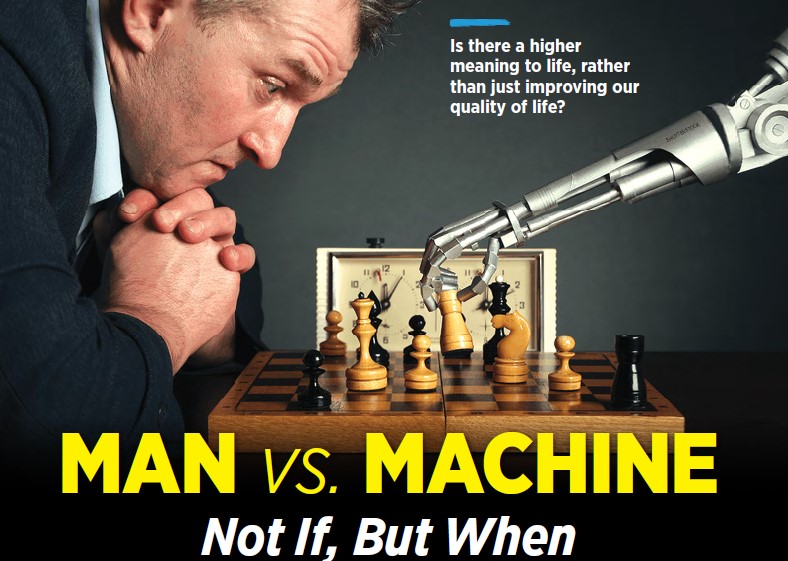By Luan Do
Nowadays, it is hard to imagine the world without automation. ‘Doing more with less’ has become a maxim at every social stratum, all in the name of improving quality of life.
Will there be a turn to the mutualistic symbiosis between man and machine?
While this topic is still hotly debated, its impact on society has already been evident.
Is Your Job At Risk?
According to the 2016 World Economic Forum, almost two in three children entering primary school today will eventually embark on a career that has yet to exist till this date. Assuming an optimistic ratio of one job creation to one job displacement, this would imply that a substantial number of existing jobs are becoming obsolete.
Indeed, young people today may find it difficult to imagine occupations such as milkman, lamplighter, or town crier. Next on the list would possibly be bank tellers, meter readers, and also potentially, our trustworthy taxi drivers.
“The workforce in 2020 will be one that moves at lightning speed,” says Looi Qin En, co-founder of Glints, an online platform that has helped over 200,000 youths with their careers. “We are not talking about years for change to impact; we are talking about seconds and minutes,” Looi adds.
Recently, there has been a popular school of thought that the impact of automation would be most disruptive for the low-skilled working class. Unfortunately, that school of thought, too, has been made old-fashioned.
Automation has turned “blind to the colour of your collar”, asserts Jerry Kaplan, a Stanford academic and author of ‘Humans Need Not Apply’. Given the state of today’s advancement alone, the key factor that determines if your job can be automated appears to be whether or not it is routine.

According to a study by researchers at Oxford University and Deloitte, a chartered and certified accountant and financial accounts manager, in 20 years from now, would share similar automation risk with their low-skilled counterparts such as assembler and routine operative, all of which carry a risk of 95% and above.
Indeed, occupational vulnerability is no longer confined to jobs that are manual or low-skilled.
On the other end of the spectrum, jobs that require a human touch were found to be among those who are the least vulnerable, such as hotel manager (0.4%) and psychologist (0.4%).
Perhaps it is just a matter of time.
Also, the immunity to automation in the legal profession is currently being questioned.
“Legal, right now, I think is in the place that other industries were 10 and 15 years ago, like travel,” says Noory Bechor, CEO of LawGeex, a leading AI-powered platform for legal contract review. “[The LawGeex platform] can take a new contract, one that it’s never seen before, read it and then compare it to a database of every similar contract that it’s seen in the past,” he adds.
Will there be a time when man is judged by machine?
Machines are learning
While experts are warning the populace about the dark side of automation – for instance, Professor Stephen Hawking emphasised that the rapid evolution of Artificial Intelligence could end mankind – supporters of automation are still holding their ground with the evident benefits of automation.
Dilli Vinay Kumar, a highly experienced typist at a construction multinational company (MNC) in Singapore, shared with Epoch Times that automation has remarkably reduced his workload by at least half, allowing him to enhance the quality of work that was once overwhelming.
Vinay’s story is indeed an echo of the general economic backdrop today.
For instance, over the past three years, Amazon’s investment in robots has allowed the organisation to grow more quickly and hire more workers. The deployment of robots and the employment of workers have grown consistently, at a three-year rate of 300% and 175% respectively.
Such optimism, though, should be taken with caution.
Dexterity has been one of the reasons why workers are preferred at Amazon. However, through vigorous research and development, this comparative advantage may cease to exist in the near future. The MIT Technology Review recently reported about “a dexterous warehouse”, where the newly developed Toru robot was described as “more like a human picker”. In fact, the robust upgrading has allowed the human-robot ratio at Amazon to decrease by 40% over the past three years.
Are we able to upgrade ourselves as frequently as robots do?
So, while Vinay is seizing every opportunity to upgrade himself to perform more technologically advanced tasks, he is also aware of a technology that can completely take his job off the list one day. Naturally, he intends to eventually switch to the finance industry, but his idea is still nascent due to high barriers to entry, such as the cost involved to obtain the required certification.
“I don’t know,” Vinay says in hesitation, when asked about what his future plan might be.
Man’s Mission
In the age of rapid automation, the question of what we should do to remain relevant has become a topic under intense study.
Various ideas have been suggested, including Bill Gates’ proposal for taxation on robots, which would raise revenue for necessary skills development and social welfare.
Nevertheless, one of the biggest obstacles of such propositions would be the market force, which often claims such efforts would hamper innovation and productivity.
In order to address the matter holistically, perhaps we should ponder upon what we are pursuing as a human race.
Is there a higher meaning to life, rather than just improving our quality of life?
Let us know your thoughts at feedback@epochtimes.com.sg
















